Related Research Articles
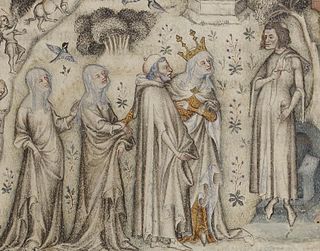
Guillaume de Machaut was a French composer and poet who was the central figure of the ars nova style in late medieval music. His dominance of the genre is such that modern musicologists use his death to separate the ars nova from the what is now termed ars subtilior. Regarded as the most significant French composer and poet of the 14th century, he is often seen as the century's leading European composer.

Isorhythm is a musical technique using a repeating rhythmic pattern, called a talea, in at least one voice part throughout a composition. Taleae are typically applied to one or more melodic patterns of pitches or colores, which may be of the same or a different length from the talea.

Ars subtilior is a musical style characterized by rhythmic and notational complexity, centered on Paris, Avignon in southern France, and also in northern Spain at the end of the fourteenth century. The style also is found in the French Cypriot repertory. Often the term is used in contrast with ars nova, which applies to the musical style of the preceding period from about 1310 to about 1370; though some scholars prefer to consider ars subtilior a subcategory of the earlier style. Primary sources for ars subtilior are the Chantilly Codex, the Modena Codex, and the Turin Manuscript.

Allen Forte was an American music theorist and musicologist. He was Battell Professor Emeritus of the Theory of Music at Yale University and specialized in 20th-century atonal music and music analysis.
Gustave Reese was an American musicologist and teacher. Reese is known mainly for his work on medieval and Renaissance music, particularly with his two publications Music in the Middle Ages (1940) and Music in the Renaissance (1954); these two books remain the standard reference works for these two eras, with complete and precise bibliographical material, allowing for almost every piece of music mentioned to be traced back to a primary source.
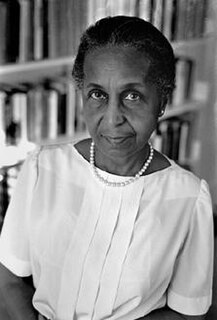
Eileen Jackson Southern was an American musicologist, researcher, author, and teacher. Southern's research focused on black American musical styles, musicians, and composers; she also published on early music.
Andrew Lawrence-King is a harpist and conductor from Guernsey known for his work in early music.
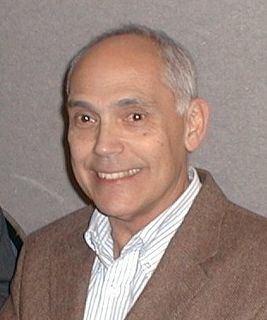
Alejandro Enrique Planchart was a Venezuelan-American musicologist, conductor, and composer. He was considered to be one of the leading scholars on the music of Guillaume Du Fay; more broadly, he was a specialist on music of the Middle Ages and early Renaissance music.

Christopher Page is a British expert on medieval music, instruments and performance practice, together with the social and musical history of the guitar in England from the sixteenth century to the nineteenth. He has written numerous books regarding medieval music. He is currently a Fellow of Sidney Sussex College, Cambridge, where he is an Emeritus Professor in the University.
Michael Angold is Professor Emeritus of Byzantine History and Honorary Fellow in the University of Edinburgh.
Claude Victor Palisca was an internationally recognized authority on early music, especially opera of the Renaissance and Baroque periods, and was Henry L. and Lucy G. Moses Professor Emeritus of Music at Yale University. He is best known for co-writing the standard textbook A History of Western Music, as well as for his substantial body of work on the history of music theory in the Renaissance, reflected in his editorship of the Yale Music Theory in Translation series and in the book Humanism in Italian Renaissance Musical Thought (1985); in particular, he was the leading expert on the Florentine Camerata. His 1968 book Baroque Music in the Prentice-Hall history of music series ran to three editions.
Margaret Bent CBE, is an English musicologist who specializes in music of the late medieval and Renaissance eras. In particular, she has written extensively on the Old Hall Manuscript, English masses as well as the works of Johannes Ciconia and John Dunstaple.
Harold Stone Powers was an American musicologist, ethnomusicologist, and music theorist.
Suzannah Clark is a Canadian-British musicologist and music theorist specializing in the music of Franz Schubert, the history of music theory, and medieval music. She is currently Morton B. Knafel Professor of Music and in 2019 was named Harvard College Professor at Harvard University and from 2016–2019 served as chair of the Music Department at Harvard.
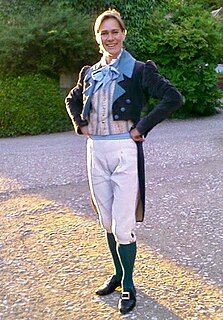
Catherine King is an English mezzo-soprano, best known for her performances and recordings of mediaeval, renaissance and baroque music and also very active in performing classical oratorio, opera and contemporary music. She is the only female member of Gothic Voices and has made over 40 recordings.

Thomas Forrest Kelly is an American musicologist, musician, and scholar. He is the Morton B. Knafel Professor of Music at Harvard University. His most recent books include: The Role of the Scroll (2019), Capturing Music: The Story of Notation (2014), and Music Then and Now (2012).

Mark Everist is a British music historian, critic and musicologist.
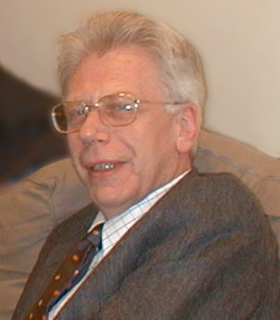
David Fallows is an English musicologist specializing in music of the late Middle Ages and Renaissance and the performance practice of music. He is a leader in fifteenth-century music studies, particularly Guillaume Dufay, Josquin des Prez, and secular song.
James Haar was an American musicologist and W.R. Kenan Jr. Professor Emeritus of Music at the University of North Carolina at Chapel Hill. A specialist in Renaissance music, he was the Editor-in-chief of the Journal of the American Musicological Society from 1966 to 1969 and served as the president of American Musicological Society from 1976 to 1978. He was elected a member of the American Academy of Arts and Sciences in 1987.

Francis Llewellyn Harrison, better known as "Frank Harrison" or "Frank Ll. Harrison" was one of the leading musicologists of his time and a pioneering ethnomusicologist. Initially trained as an organist and composer, he turned to musicology in the early 1950s, first specialising in English and Irish music of the Middle Ages and increasingly turning to ethnomusicological subjects in the course of his career. His Music in Medieval Britain (1958) is still a standard work on the subject, and Time, Place and Music (1973) is a key textbook on ethnomusicology.
References
- 1 2 "Emeritus Professor honoured by American Musicological Society". King's College London.
- ↑ "Professor Daniel Leech-Wilkinson". Kings People - King’s College London. University of London. Retrieved 7 March 2021.
- ↑ "AMS Awards 2019". American Musicological Society. Retrieved 2 November 2020.